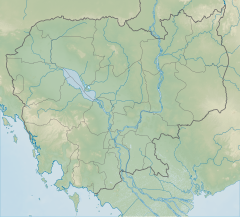Preah Monivong National Park
National park in Cambodia From Wikipedia, the free encyclopedia
Preah Monivong Bokor National Park (Khmer: ឧទ្យានជាតិព្រះមុនីវង្ស បូកគោ, pronounced [ʔuʒiən ciət prĕəh muniːvuŋ]) is a national park in southern Cambodia's Kampot Province that was established in 1993 and covers 1,544.58 km2 (596.37 sq mi).[1] In 2003, it was designated as an ASEAN Heritage Park.[2] It is located in the Dâmrei Mountains, forming the southeastern parts of the Cardamom Mountains. Most of the park is about 1,000 metres above sea level and the highest peak is Phnom Bokor at 1,081 metres, also referred to as Bokor Mountain.
| Preah Monivong Bokor National Park | |
|---|---|
| Bokor National Park | |
 On Phnom Bokor | |
| Location | Kampot Province, Cambodia |
| Nearest city | Kampot |
| Coordinates | 10°51′43″N 104°01′56″E |
| Area | 1,544.58 km2 (596.37 sq mi)[1] |
| Established | 1993[1] |
| Governing body | Ministry of Environment |
| Website | https://kampot.city/bokor_national_park |
History
Summarize
Perspective
The Dâmrei Mountains was formerly a Khmer Rouge controlled area, but in 1993, Preah Monivong National Park was inaugurated along with most other national parks in Cambodia. It is one of two ASEAN Heritage Parks in the country.[2]
Preah Monivong National Park is well known for the abandoned Bokor Hill Station, a remote settlement build by the French colonialists in 1921. They also built a Catholic church nearby in 1928, a very rare sight in Cambodia. The park is named after King Sisowath Monivong who used to visit the area and eventually died here in 1941. Monivong ordered the construction of a Buddhist temple in the area in 1924.
In recent times the national park has become a popular tourist destination and now includes Thansur Bokor Highland Resort, a large luxury hotel built in 2012.[3] In 2010, a large statue of Lok Yeay Mao was constructed in the area. Lok Yeay Mao is a mythic heroine from Cambodian Buddhism and is said to protect travellers, hunters and fishing men. At 29 metres, it is the tallest Yeay Mao statue in the country.
In 2019, the government released a "Master Plan for Bokor City Development Project until 2035", by which 18,987 hectares of the park are to be developed for residents, tourism, and businesses.[4][5]
Flora and fauna
Forest types in the park include dipterocarp, deciduous, tropical evergreen and mangrove forests. Burretiodendron hsienmu, a threatened species, is also found in the park. A study by the University of Maryland found that the park had lost about 9% of primary forest between 2001 and 2019, with deforestation continuing in 2020 and 2021.[5]
Park animal species include elephant, pileated gibbon, gaur, banteng, Indian civet, dhole and Asiatic black bear. Bird life includes chestnut-headed partridge and green peafowl.[5]
Gallery
- View towards Kampot and the Gulf of Thailand from Phnom Bokor
- Stone formations with offering sites
- Lok Yeay Mao Statue
- Wat Sampov Pram (Buddhist temple)
- Catholic church (1928) near Bokor Hill Station
- Crinum asiaticum in the park
References
External links
Wikiwand - on
Seamless Wikipedia browsing. On steroids.







